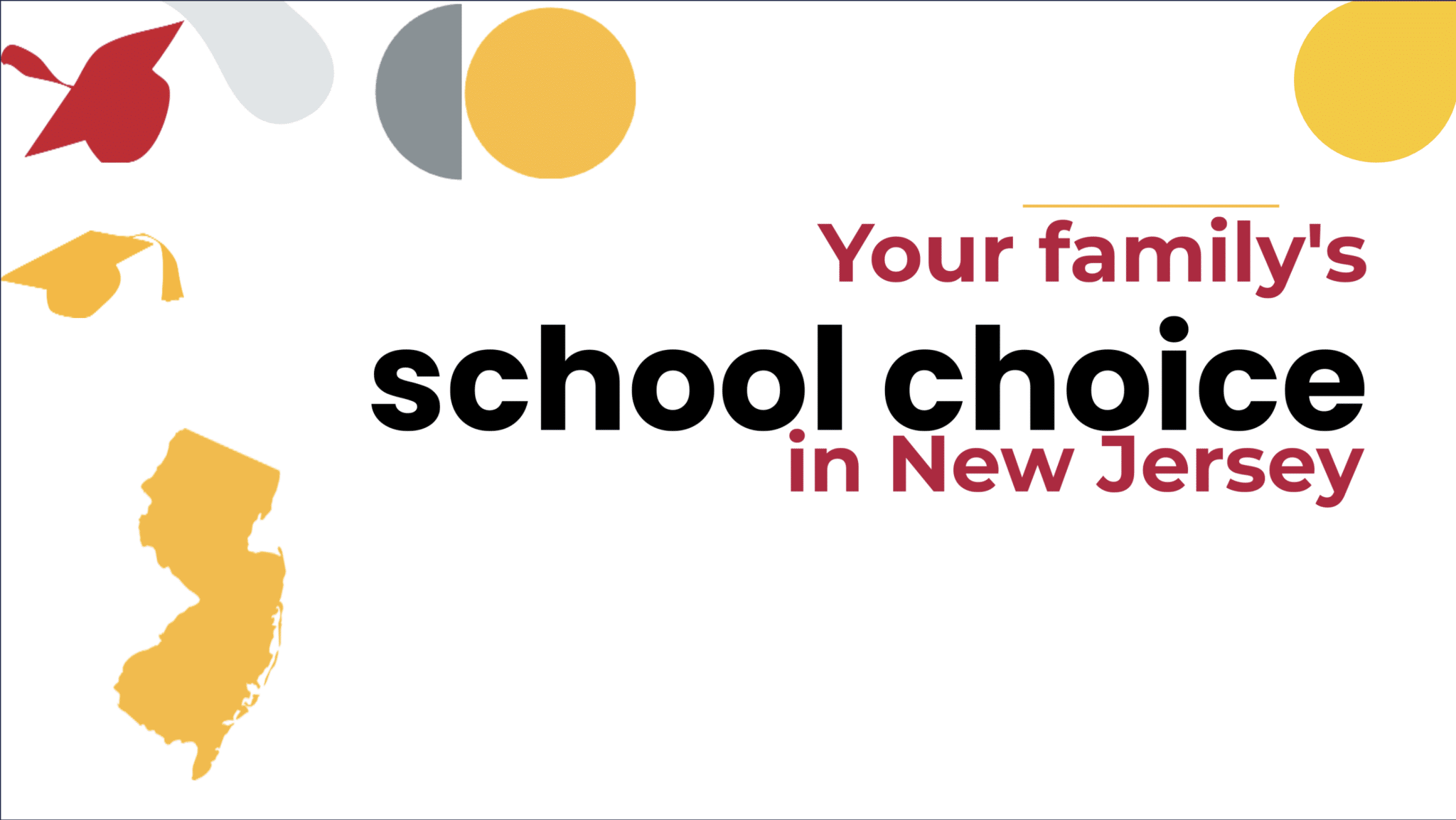Choosing a school? You’ve got options.
If you live in New Jersey, you have access to more K-12 education options than you might realize. Navigating these options can help you find a school where your child thrives, but it can also feel overwhelming at first. This post will breakdown the main types of schools available to you in New Jersey, as well as provide additional education resources to help you find the best learning environment for your child.
There are a variety of school choices available to New Jersey families. You can choose from traditional public schools, public charter schools, public magnet schools, private schools, online learning, homeschooling, and microschooling and mix-and-match learning.
Looking for special education options? You can learn what special education services are available in New Jersey at the Ultimate Guide to Special Education.

- Traditional Public Schools
- Public Charter Schools
- Public Magnet Schools
- Private Schools
- Online Schools
- Homeschool
- Microschooling
New Jersey Traditional Public Schools
Most New Jersey families (81.6% of all K-12 students) choose traditional public schools, which are operated by school districts, free to attend, open to all students, and funded by federal, state, and local government. Did you know that New Jersey spends an average of $22,160 per public school student each year? You can search your school’s spending and that of nearby schools at Project Nickel.
In New Jersey, the state allows each district decides to set its own open enrollment policies. Open enrollment refers to whether parents can send their children to any public school, regardless of where it is located. New Jersey parents wanting to transfer their child to a different public school than the one they are assigned should contact their local school district or search choice districts at the New Jersey Department of Education. For the 2023-2024 school year, there are more than 120 participating choice districts! Each district has a unique choice application that families should submit directly to that district.
For students living farther than 2 or 2.5 miles from their public school of choice but closer than 20 miles, the sending district is responsible for transporting the child to their new school.
Open enrollment is an important public school choice, widening parents’ options and ensuring that their zip code isn’t the sole determiner of their education. Find out more about public schools in your state at the New Jersey Department of Education. You can also learn more about open enrollment at “Public Schools Without Boundaries: A 50-State Ranking.”
New Jersey Charter Schools
Charter schools are tuition-free public schools that have extra freedom to innovate with curriculum and learning methods. In New Jersey, 3.9% of all K-12 students attend a public charter school. Charter schools can collaborate with traditional classrooms to share the fruits of their innovation. According to the New Jersey Department of Education, the state has about 90 charter schools in operation serving approximately 57,000 students. Each school has a charter which explains the school’s purpose and what specific community need it serves, whether that be providing a Chinese immersion program or offering a rigorous, literacy-based curriculum.
We interviewed administration at Thomas Edison EnergySmart Charter School, New Jersey’s first school with a specific focus on green, renewable energy. “Every school has a theme, every school has its own philosophy, and every parent should be given the chance to pick how they want to raise their child and what school they want the child to go to,” said school leader Oguz Yildiz. “School choice is one important way parents can play an active role in receiving the best education possible for their children.”
If there are more families seeking admittance to a charter school than there are seats, a lottery system is usually used to determine admittance. Many New Jersey charter schools have had waitlists in the past. In January 2023, the New Jersey Department of Education approved 11 charter school expansions, which will open an additional 2,299 charter school seats for students across nine cities and towns.
Check out more about your state’s charter schools at the New Jersey Public Charter Schools Association. Families in Newark may also wish to explore charter schools using My Schools Newark.
New Jersey Magnet Schools
You can also choose magnets! Magnet schools are free public schools that allow kids to focus on specific themes, like STEM, health sciences, or the performing arts. An AgriScience program at Middlesex County Magnet Schools, for example, emphasizes food science and plant cultivation. If there’s a magnet school near you with a theme your child is interested in, this could be an exciting option to consider.
New Jersey has several magnet schools throughout the state. For instance, you can read about Montclair Public Schools’ approach to magnet schools, Union County Vocational-Technical Schools’ offerings, Middlesex County Vocational and Technical schools, Monmouth County Vocational School District’s options, and Newark Public Schools’ magnet schools. New Jersey Family posted this piece with some additional information on New Jersey’s magnet schools.
New Jersey Private Schools
Of course, private schools are another choice for New Jersey families. Private schools are nonpublic schools that charge tuition. There are more than 1,300 private schools across the state of New Jersey. 11.7% of all K-12 students in New Jersey attend a private school. You can find a complete list at the New Jersey Department of Education. The average tuition for private schools in the state is $14,234 for elementary schools and $18,871 for high schools.
These schools come in all shapes and sizes. For instance, we recently talked to Dr. Robert Beebe, Principal at New Hope School, a private K-8 school in Clifton, New Jersey. He told us about the private school’s character development program and partnership with parents, describing how the school was founded by a couple of moms who were looking for a values-based education for their children. “[Our approach to education] begins with what we call cultivation of the heart,” said Beebe. “This begins in the home before even coming to school. We should first of all be concerned about developing children’s hearts, which is the basis of their character.”
Unfortunately, there are no state-run scholarship options in New Jersey, though private scholarships may be available, such as through the Tri-County Scholarship Fund, the Student Partner Alliance, and The Wight Foundation. You can find additional tips for financing private school at New Jersey Family. Also, the federal government allows parents to save for K-12 private school tuition using tax-preferred 529 savings accounts.
Learn more at Catholic Partnership Schools, the Tri-County Scholarship Fund, and Private School Review: New Jersey.
New Jersey Online Learning
Don’t overlook online learning! It offers a uniquely flexible learning environment that meets a variety of family needs. Whether your child wants to accelerate his or her learning or needs a quieter environment in which to focus, you may be interested in giving virtual school a try.
Unfortunately, New Jersey does not have a free, full-time online school option. However, New Jersey Virtual School offers full-time and credit-recovery enrollment to students in grades 6-12 for a fee. Also, starting in 2023, New Jersey Virtual School is partnering with Brookdale Community College to allow high school students to take college-level credits online. Enrollment at the virtual school typically begins in April and courses begin in September, but if students are interested in enrolling mid-year, they may be able to do so. Students attending New Jersey Virtual School must have access to technology and wifi.
Besides New Jersey Virtual School, students can also consider other paid online school options, like George Washington University Online High School, The Keystone School, Excel High School, Massachusetts Mayflower Academy, and K12 Private Academy.
Another part-time course option some New Jersey families may access through their local school is VHS Learning. You can ask your school if supplementary online courses are available to you.
To read more about online learning in New Jersey, check out the Digital Learning Collaborative’s state profile.
New Jersey Homeschooling
Parents in all 50 states can also consider homeschooling, the process of educating students at home. Homeschooling offers opportunities for highly customized, personal learning. In New Jersey, there are more than 5,000 (2.8%) students homeschooling.
In New Jersey, it is not required that you provide notice of your intent to homeschool; however, it is recommended that you formally withdraw from your public school so your student is not marked truant. In the case that you decide to return to public school, your student’s placement may be based on standardized testing assessment.
The state requires homeschooling parents to give children an education that is academically “equivalent” to what he or she would receive at school, but does not require standardized testing for homeschoolers. Keep in mind that, while homeschool students in New Jersey are not legally prohibited from playing on public school sports teams, individual district policies often prevent them from participating. You can check with your local district about their policies, or look for other leagues and activities available to you!
You can also check out the New Jersey Department of Education and Home School Legal Defense Association – New Jersey.
New Jersey Microschools and Mix-and-Match Learning
Today, many New Jersey families are mixing and matching school options to come up with new ways to personalize education. Microschools are one of these ways. A microschool refers to students gathering together in a small group – with adult supervision – to learn, explore, and socialize. Microschools can take a variety of shapes and legal forms, from homeschoolers coming together at an enrichment center to a private school committed to small classrooms. What microschools share in common is a commitment to small-group learning and close-knit relationships, along with an emphasis on children as individual learners.
Here are real examples of microschools and related resources in New Jersey:
- Tranquil Teachings Learning Center is a private membership association offering flexible learning opportunities, including half-day and full day options, in Monmouth County.
- The Village Electric is a flexible learning center in Mountainside that describes its offering as “colearning,” blending the benefits of homeschooling with the resources, staff, and community of a private school.
- Founded by parents, Metsada Learning Network provides legal, technological, and administrative support to brick-and-mortar alternative learning initiatives in New Jersey.
- Note that in New Jersey, providing care for more than six children under the age of 13 requires a childcare license.
Remember, microschooling is more a mentality than a specific legal distinction in most cases. Often, a family participates in a microschool while legally homeschooling, or being enrolled in a private or online school.
Search for Schools Near Me
Learning Pods
How can it empower parents and help kids achieve their dreams?
7 Step Guide
Tips to help you find a school where your daughter or son will learn, succeed, and be happy.
Education Resources for
New Jersey Parents
For additional information about school choices in New Jersey, visit these resources:
Every state is different when it comes to school choice options.
Sign up below to get a detailed comparison:
"*" indicates required fields
